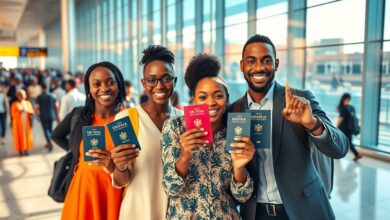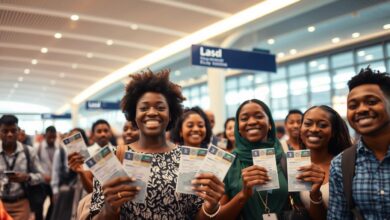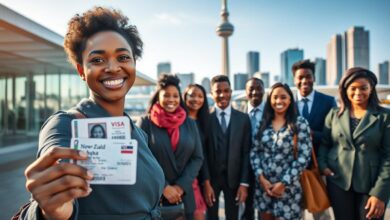Visa Sponsorship Netherlands: Pathways for Nigerian Professionals
Visa sponsorship in the Netherlands is a clear path for Nigerian professionals. It allows them to get legal work authorization and work towards residency. This guide will show how employer-backed permits and programs can help Nigerian professionals relocate to Holland and grow their careers.
The Dutch labor market is in high demand for fields like information technology, engineering, healthcare, agriculture, and logistics. Companies like ASML, Philips, and ING, along with tech startups, often sponsor visas for specialized roles. Dutch policies also encourage skilled migration to fill gaps and improve competitiveness.
Employer-sponsored routes offer real benefits. They include valid work permits, access to social security and healthcare, and quicker paths to residency through schemes like the highly skilled migrant program. Some permits also allow for family reunification and more career opportunities in the EU, making Immigration to the Netherlands a smart choice for many Nigerians.
This article is for Nigerian nationals in Nigeria and abroad who want practical advice on Visa Sponsorship Netherlands. It uses official Immigration and Naturalisation Service (IND) guidance and job portals like LinkedIn, Indeed Netherlands, and Glassdoor. It aims to provide accurate, useful information.
Understanding Visa Sponsorship in the Netherlands
Visa sponsorship in the Netherlands means a Dutch employer helps get a work and residence permit for someone from abroad. The Immigration and Naturalisation Service (IND) and the Ministerie van Sociale Zaken en Werkgelegenheid manage the rules. Sponsors help speed up the process and report on their employees.
An employer can apply for various permits when sponsoring a visa. These include permits for work, for highly skilled migrants, and a single permit for both work and living. Some jobs, like seasonal farm work, have special permits with limits.
Definition of Visa Sponsorship
Visa sponsorship involves an employer sending documents and a request to the IND for a candidate. They confirm the job, salary, and contract details. For many non-EU/EEA workers, having a sponsor is essential for legal work and living in the Netherlands.
Importance for Foreign Professionals
Visa sponsorship is crucial for moving to the Netherlands. It allows for legal work and access to social benefits. Sponsored workers can also bring their families and work towards long-term residency. Nigerian professionals can use this to grow their careers in Dutch companies.
- Check an employer’s recognized sponsor status on the IND list before accepting an offer.
- Understand whether the role falls under employer-initiated permits or self-employment rules.
- Confirm any sector-specific quotas or season limits that might apply.
Types of Work Visas Available
The Dutch labour market offers several distinct routes for Nigerians who want to work in the Netherlands. Each route has specific eligibility rules, employer responsibilities, and time limits. Applicants should review options against career goals and company arrangements before applying.
Highly Skilled Migrant visa
The Highly Skilled Migrant route targets professionals recruited by recognized sponsors. Eligibility hinges on employment with a registered sponsor and meeting minimum salary thresholds that vary by age and experience. The Dutch government updates these salary requirements annually and makes special provisions for recent graduates and essential knowledge migrants.
Benefits include fast-track IND procedures, the right to family reunification, and a clear pathway toward permanent residence for long-term skilled careers. Common hiring sectors are IT, engineering, finance, and research. Applicants should confirm current thresholds on IND pages and work with employer HR to verify sponsor status.
Intra-Corporate Transfer permit
The Intra-Corporate Transfer option lets multinationals move staff to a Dutch branch for training, specialist projects, or management duties. It is employer-driven and suits Nigerians already employed by international firms with a Netherlands presence. Different rules apply to managers, long-term transfers, and trainees.
Duration limits separate short-term ICT transfers from longer assignments. Employers must initiate the process and supply corporate documentation. This permit supports corporate mobility but generally does not offer the same fast track to permanent residency as the Highly Skilled Migrant route.
Seasonal work visa
The Seasonal work visa Netherlands is for temporary labour needs in horticulture, agriculture, and hospitality. Employers have obligations to provide suitable work conditions and to prioritize EU/EEA workers before hiring non-EU seasonal staff.
These permits are for short-term contracts and include a single permit that covers work and residence. Maximum stays are limited and do not normally lead to permanent residency. Employers handle recruitment and permit submission, following sector-specific rules for seasonal demand.
Which route fits which stage?
- Long-term skilled careers: the Highly Skilled Migrant pathway is best for professionals aiming to settle and progress in sectors facing a Skilled worker shortage Netherlands.
- Corporate transfers: choose the Intra-Corporate Transfer when a multinational assigns staff for specific company needs.
- Short-term labour: the Seasonal work visa Netherlands fits temporary roles in agriculture and hospitality.
Other permits, such as the EU Blue Card, may suit high-skilled applicants who meet specific salary and qualification thresholds. Practical guidance is available on IND pages and through employer HR or immigration specialists who can explain company-specific processes and current figures.
Eligibility Criteria for Nigerian Applicants
Before applying for a sponsored job, it’s important to know what employers and the IND check. The rules differ based on the job and visa type. But, there are common requirements for most Nigerian applicants in the Netherlands.
Educational background is key for many permits. Most skilled jobs require a recognized bachelor’s or master’s degree. Dutch employers accept degrees from accredited institutions.
Some jobs need a credential evaluation through Nuffic or an employer-led assessment. For example, nursing jobs require registration with the BIG-register or similar steps before a permit is granted.
Educational verification includes certified transcripts, diploma attestation, and sometimes course-by-course evaluations for specific job standards.
Work experience is also important. Employers look for relevant experience and skills. The Highly Skilled Migrant route focuses on salary and job level, but senior roles often require two to five years or more of experience.
Intra-corporate transfers need an existing job with a multinational. Seasonal work permits target immediate needs and may accept limited experience if the candidate meets practical job requirements.
Language skills affect employability in many sectors. English is common in tech, research, and international firms. Many job listings require English as the working language. Dutch skills help in healthcare, education, customer-facing roles, and local small and medium enterprises.
Some regulated professions require Dutch language certification or proof of language training for professional registration. Common tests include IELTS for English and NT2 exams for Dutch. Employers may also check in-house for practical communication skills.
- Criminal record checks and police clearances are commonly required.
- Health screenings or proof of medical fitness may be requested for certain roles.
- Proof of financial means for initial relocation can be asked by employers or the IND.
Applicants should check specific rules for their profession, like healthcare, law, and teaching. Confirming these details early can improve your chances in competitive markets. It also aligns with the Nigerian workforce opportunities in the Netherlands.
The Application Process Explained
The Application process Visa Sponsorship Netherlands is straightforward. It starts with a job offer from a sponsor. Then, it involves permit requests, embassy steps, and local registration upon arrival. Planning ahead can help avoid delays and improve your chances of success.
Step-by-Step Overview
1. First, get a job offer from a sponsor in the Netherlands.
2. The employer then applies for the right permit at the Immigration and Naturalisation Service (IND).
3. The IND reviews the application and makes a decision. Decisions are usually quicker for recognized sponsors.
4. If needed, apply for an MVV visa at the Dutch embassy or consulate in Nigeria.
5. After getting the visa, travel to the Netherlands. There, you’ll get a residence permit from the IND or the municipality.
6. Finally, register with the municipality (BRP) and get a BSN. This completes your Dutch residency process.
Required Documentation
- Valid passport with enough validity.
- Signed job contract or formal offer showing salary and terms.
- Employer sponsorship letter confirming sponsorship intent.
- Proof of qualifications: degree certificates and transcripts.
- Curriculum vitae detailing relevant experience.
- Proof of accommodation or a declaration of intent to reside.
- Recent passport photos meeting Dutch visa specifications.
- Certificate of good conduct or criminal record check.
- Medical insurance details, if requested.
- Any profession-specific registrations, licenses, or certificates.
Some documents need legalization or an apostille. You might need certified translations into Dutch or English. Preparing these early can prevent delays in the Application process Visa Sponsorship Netherlands.
Typical Processing Times
IND decisions for recognized sponsors usually take weeks to a few months. Work permits for highly skilled migrants can be faster, sometimes processed in weeks.
MVV and embassy handling can add weeks to the timeline. Seasonal work permits have shorter cycles.
Processing times can change, so check IND updates and stay in touch with your employer. Choosing recognized sponsors can speed up the process and reduce uncertainty.
Practical tip: Get certified translations and apostilles early. Keep in touch with employers and choose recognized sponsors to streamline the process.
Finding Sponsored Job Opportunities
Looking for a sponsored job in the Netherlands involves online searches, targeted outreach, and networking. Nigerians should plan carefully. They should use top job boards, professional networks, and reputable recruiters. This approach can help secure Netherlands job sponsorship and smooth Nigerian relocation to Holland.
Best job platforms for Nigerians
- LinkedIn Netherlands, Indeed Netherlands, Glassdoor, and Monsterboard list sponsor-ready jobs.
- Together Abroad and Dutch startup boards offer chances in small firms and tech teams.
- Sector-specific sites help find jobs: Techleap for startups, Medisch Contact for healthcare, and company pages for Shell, Unilever, Philips, and Heineken.
Networking strategies in the Netherlands
- Join LinkedIn groups and alumni networks from Nigerian universities in the Netherlands.
- Attend virtual job fairs, webinars, and events by the Netherlands-Nigeria Chamber of Commerce.
- Visit industry meetups, conferences like The Next Web, and local chambers of commerce events when in-country.
Connecting with recruitment agencies
- Work with firms like Randstad, Adecco Netherlands, Michael Page Netherlands, and Hays Netherlands for international placements.
- Specialized recruiters can find jobs with Dutch employer sponsorship and help with visa steps.
- Check agency credentials and avoid those asking for large fees for guaranteed placement.
Practical outreach tips
- Customize CVs to Dutch formats and write cover letters showing willingness to relocate and accept sponsorship.
- Use both Dutch and English keywords to find more listings on Best job platforms Netherlands.
- Check if employers are recognized sponsors before applying.
Role of Employers in Visa Sponsorship
Employers are key when Nigerian professionals want to work in the Netherlands. They must follow the law, handle paperwork, and offer support. This makes it easier for migrants to settle in.
Employer Obligations and Responsibilities
To sponsor a worker, employers need recognized status with the Immigration and Naturalisation Service. This status lets them apply for work and residence permits for their staff.
Employers must ensure contracts meet IND salary and other conditions. They also follow Dutch labor laws on wages, taxes, and social security.
Companies either apply for permits themselves or work with immigration lawyers. They must report any job changes to IND and could be responsible for repatriation costs.
How Employers Can Facilitate the Process
Employers can make visa steps easier by getting recognized sponsor status and preparing all documents. Clear contracts that meet IND rules help avoid delays.
Many companies arrange for MVV invitations, airport pick-up, and temporary housing. They also help with registration and may offer language training or orientation.
Employers often use immigration lawyers or HR specialists to stay compliant. Big companies like ASML, ING, and Booking.com actively look for international talent. They use these resources to help their hires.
Practical advice for applicants
- Find out if the employer is a recognized sponsor and what they do in the process.
- Ask about the costs the employer will cover, like relocation and permit fees.
- Request timelines and details of any relocation package or language support.
Good employer support benefits both companies and candidates. Dutch employer sponsorship helps solve the skilled worker shortage in the Netherlands. It opens up access to specialized skills and supports innovation. Candidates who check employer support are more likely to have a smooth transition into sponsored careers in the Netherlands.
Challenges Faced by Nigerian Professionals
Moving to the Netherlands is exciting but also comes with challenges. Many Nigerian professionals meet the job requirements but face practical issues. Knowing these common problems helps them prepare better.
Common Obstacles in the Visa Process
Employers might not sponsor due to cost or not knowing the rules. Some don’t meet the salary needs for the Highly Skilled Migrant route. Getting documents legalized and recognized can take weeks.
When paperwork is not complete, processing times get longer. For jobs like healthcare and engineering, local registration is needed. Showing relevant experience can be hard when records are not formal.
Rejections often happen because of missing translations or unverified documents.
Cultural and Adjustment Issues
The Netherlands values direct feedback and flat hierarchies. This can be a big change for those used to other management styles. Living in cities like Amsterdam or Utrecht is expensive due to high living costs.
Adjusting to Dutch culture, weather, and daily life takes time. Cultural awareness training before moving helps. Planning finances for the first few months and finding housing early makes the transition smoother.
Language Barriers in the Workplace
English is common in multinational companies, but Dutch is needed for customer-facing roles and public jobs. Language gaps hinder social integration and career growth. This is a major issue in the Netherlands.
Steps to overcome this include taking NT2 Dutch courses and joining workplace language programs. Community colleges and employer training help with fluency. Building a network of colleagues and mentors aids in daily learning.
- Verify all document requirements early and use certified translators.
- Plan transitional finances to cover housing and permit delays.
- Use relocation services and local Nigerian professional groups for mentorship.
Dealing with visa sponsorship challenges in the Netherlands and relocation issues in Holland requires planning and support. With the right preparation, applicants can reduce risks and have a smoother move.
Success Stories of Nigerian Professionals
More Nigerian professionals are finding careers in the Netherlands with employer sponsorship. They share steps like getting a sponsored job, registering with the municipality, learning Dutch, and aiming for more. These stories can help others plan their paths.
Inspiring experiences from immigrants
Engineers from Lagos landed jobs in Dutch consultancies and climbed to project lead in three to five years. Nurses at Erasmus MC got Dutch registration and better pay through employer training. Software developers at ASML and Booking.com quickly entered European markets and built strong networks.
Impact of visa sponsorship on careers
Visa sponsorship can lead to higher salaries and career growth. It offers paid certifications, mentorship, and international assignments. Many have moved into senior roles or started businesses serving both Nigerian and Dutch markets.
Lessons learned and practical tips
- Focus on in-demand skills like data engineering, healthcare, and construction.
- Make your CV Dutch-friendly and show your achievements.
- Choose employers known for sponsoring and offering clear career paths.
- Keep networking on LinkedIn and at events in Amsterdam or Rotterdam.
- Put effort into learning Dutch and getting local certifications for certain jobs.
For real stories and tips, check out LinkedIn, company blogs, and interviews in DutchNews.nl and NL Times. These share detailed experiences and advice on how to succeed in the Netherlands.
By following these tips, you can see how visa sponsorship can boost your career. The opportunities in Holland go beyond just a job. They lead to senior roles, family reunification, and starting your own business with the right skills, sponsor, and learning.
Resources and Support for Applicants
Applicants from Nigeria should start with official channels. The Immigration and Naturalisation Service (IND) deals with visa applications and sponsor recognition. The Netherlands Enterprise Agency (RVO) helps employers. The Ministry of Social Affairs and Employment sets labor rules for sponsored work.
Dutch embassies and consulates in Abuja and Lagos handle visa steps locally. For checking academic credentials and study-to-work info, Nuffic offers advice. This helps applicants understand the visa sponsorship process in the Netherlands.
Non-profit and international organizations help with practical relocation issues. The International Organization for Migration (IOM) gives country-specific guidance. Local NGOs offer integration services like housing advice and language support.
Business networking can be supported by the Netherlands-Nigeria Chamber of Commerce. These resources help applicants understand the visa sponsorship process in the Netherlands.
Online communities offer real-time tips and peer support. LinkedIn groups for Nigerians in the Netherlands and Reddit subforums like r/Netherlands provide practical guides. Expatica and IamExpat also offer valuable advice.
Meetup.com and specialized Facebook groups help with housing leads and language exchange. Use phrases like Online communities Nigerian relocation Holland to find targeted threads and events.
For complex files, regulated professions, or intra-company transfers, consult licensed immigration lawyers or relocation specialists. Look for reputable international firms and established Dutch consultancies. Avoid unlicensed advisors by checking credentials and reviews.
As next steps, bookmark IND pages, prepare a document checklist, and confirm the employer’s recognized sponsor status early. Join relevant online communities and start language training. When researching roles, track terms like Netherlands job sponsorship, Dutch employer sponsorship, High-demand jobs Netherlands, and Sponsored careers Netherlands to refine results.
FAQ
What is visa sponsorship in the Netherlands and how does it help Nigerian professionals?
Visa sponsorship means a Dutch employer supports a non-EU/EEA national’s work and residence permit. This support is given by applying to the Immigration and Naturalisation Service (IND) as a recognized sponsor. For Nigerian professionals, it offers legal work authorization and access to social security and healthcare.
It also helps with family reunification and a clearer path to permanent residency through schemes like the Highly Skilled Migrant. This process is faster than for employers not recognized as sponsors.
Which sectors in the Netherlands commonly offer sponsored roles for Nigerians?
High demand sectors include IT, engineering, healthcare, agriculture, logistics, and finance. Multinational companies and Dutch scaleups like Philips and Booking.com often sponsor international candidates. They fill skills shortages in these areas.
What work visa types should Nigerian applicants consider?
Key visa types are the Highly Skilled Migrant permit and the Intra-Corporate Transfer (ICT) permit. There’s also the Seasonal Work permit for temporary roles. The EU Blue Card may apply to highly qualified applicants who meet certain criteria.
The choice depends on the job’s duration, employer type, and long-term residency goals.
What are the main eligibility criteria for Nigerian applicants?
Eligibility requires a valid job offer from a recognized sponsor and relevant education. Many skilled roles need a bachelor’s or master’s degree. Professional experience is also often required.
Salary must meet IND thresholds for certain routes. Language needs vary—English is common in international firms, while Dutch is needed for some roles. Additional checks include criminal background certificates and credential verification.
What documents are usually required for a sponsorship-based application?
You’ll need a valid passport, a signed employment contract, and an employer sponsorship letter. Diplomas, transcripts, and a CV are also required. Proof of accommodation or intent to live in the Netherlands is needed.
Passport photos, criminal record checks, and profession-specific certificates may also be required. Documents often need certified translations or apostilles; check IND and embassy guidance for exact requirements.
How long does the application process take from job offer to arrival in the Netherlands?
The time varies. If the employer is a recognized sponsor, IND decisions can take several weeks to a few months. Embassy MVV or visa processing adds more weeks.
Seasonal permits are typically faster. Delays happen when documents need legalization or translations. Applicants should coordinate closely with employers to minimize delays.
How can Nigerian jobseekers find employer-sponsored opportunities in the Netherlands?
Use platforms like LinkedIn Netherlands, Indeed Netherlands, and Glassdoor. Apply directly to Dutch multinationals’ career pages. Companies like Unilever and Heineken often sponsor internationals.
Work with recruitment agencies like Randstad and Michael Page. Network via LinkedIn groups and the Netherlands-Nigeria Chamber of Commerce.
What role do employers play in the sponsorship process and what should applicants ask them?
Employers handle the permit application and ensure salary and contract compliance. They may provide relocation support. Applicants should ask about recognized sponsor status, costs, processing timelines, and relocation assistance.
Confirming recognized sponsor status through the IND list is recommended before accepting offers.
What are common challenges Nigerian professionals face when seeking sponsored roles and how can they prepare?
Challenges include employers reluctant to sponsor and failing to meet salary thresholds. Credential recognition delays and language barriers are also common. Practical hurdles include cultural adjustment and initial living costs.
Preparation includes verifying sponsor status, obtaining certified translations and apostilles early, and learning basic Dutch. Building a financial buffer for relocation is also important.
Can family members join a sponsored worker in the Netherlands?
Yes. Many sponsored residence permits allow family reunification. Conditions vary by permit type and the sponsor’s salary level. The IND provides specific requirements and documentation needed for family members’ applications.
Processing times can run in parallel or shortly after the principal applicant’s permit decision.
Do sponsored work permits lead to permanent residence or Dutch citizenship?
Sponsored work permits can lead to permanent residence if the applicant meets continuous residence, income, and integration requirements. The Highly Skilled Migrant route and other long-term permits are common pathways to permanent residency.
Citizenship requires additional residency years, language and integration exams, and renunciation of previous citizenship in many cases. Applicants should follow IND guidance and track eligibility timelines.
Are there reputable resources and organizations Nigerians should consult for accurate guidance?
Official sources include the Immigration and Naturalisation Service (IND), the Ministry of Social Affairs and Employment, and the Netherlands Enterprise Agency (RVO). The Dutch embassies in Abuja and Lagos handle visa processing.
For practical advice, consult Expatica, IamExpat, and LinkedIn groups. The Netherlands-Nigeria Chamber of Commerce and vetted immigration lawyers or relocation specialists are also good resources. Avoid unlicensed advisors and always verify credentials.
What practical steps should a Nigerian take right now to pursue Netherlands job sponsorship?
Research in-demand roles and employers in sectors like IT, engineering, and healthcare. Tailor CVs to Dutch standards and highlight openness to relocation and sponsorship. Verify employer recognized sponsor status via IND.
Prepare certified translations and apostilles for key documents. Join LinkedIn and expat communities for networking. Consider Dutch language training to boost employability in regulated or customer-facing roles.





